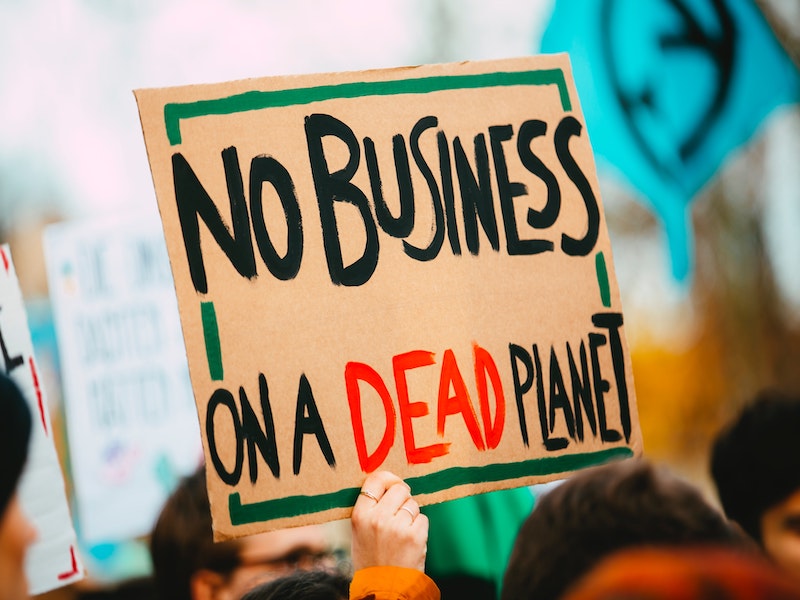A belief business is key to creating a sustainable society remains unwavering, despite the facts suggesting otherwise
In 2020 a group of scientists began an article saying, “scientists have a moral obligation to clearly warn humanity of any catastrophic threat and to “tell it like it is.” On the basis of this obligation…we declare…clearly and unequivocally that planet Earth is facing a climate emergency.” This obligation to tell the truth stands in contrast to the unwavering optimism oozing out of business circles. The attitude of business is one of, sure, there’s a problem, but nothing business can’t handle. Given the synopsis from scientists, why the optimism?
Well, the private sector is believed to be the driver of innovation, the fruit of social prosperity and the source of wealth creation in society. Markets solve social problems by stimulating economies. And ever since the 1980s, the neoliberal belief that the free market would improve the quality of life for everyone has dominated most of the Western world. Underlying this belief is that if governments don’t intervene, markets will produce efficient and fair social outcomes. Sustainability is all about meeting the needs of society within environmental limits. Given the importance of business in creating shared prosperity, a belief business is key to achieving sustainability seems logical.
But five minutes in the real world will quickly show you this argument — that all we need to do is give businesses freedom, and the invisible hand of the market will solve all of our problems — is entirely flawed. The underlying problem is that the rules of the game businesses follow revolve around maximising profits. The profit motive means markets only exist when there is money to be made. You can’t make money from solutions to all social problems, hence why charities exist.
So why is the profit motive a problem? One reason is that in markets, every company is in fierce competition to get a larger market share. They do so by selling more products. Selling more means they need to make more. Making more drives the price of an individual product down, decreasing costs, which helps to increase margins. The compulsion to continually sell more means companies must convince consumers to continually buy more. If we’re not all convinced to buy more, they can’t make more, which makes it harder to increase their market share. It also means output doesn’t increase, which is integral to the health of the overall economy as it leads to economic growth.
Economic growth has become the holy grail in modern society because growth creates a rising tide that raises all boats. Globalisation is considered vital to ending poverty and ensuring every person has their needs met. The idea is that a more connected world economy invigorates economic growth. Stimulating developing economies will create more businesses, who will employ more people, which will lead to higher incomes. Higher incomes will allow more people to meet their needs and buy consumable goods that allow them to improve their living standards.
The reality has been very different. A more connected world economy has worked out nicely for multinational corporations and wealthy individuals but is terrible for large sections of humanity. Between 1981 and 2001, the fraction of Africans living below the international poverty line increased from 42 to 47 percent. Since the turn of the century, “the poorest half of the world’s population has received just one per cent of the total increase in global wealth, while half of that increase has gone to the top one per cent.” The result is that 2.9 billion people own just 1.3 per cent of human wealth.
When globalisation has created economic growth, a disproportionate amount has gone into the hands of the few. While the rich have got richer, the poor have remained poor. The result is that 850 million people don’t have enough to eat. Oxfam estimates 11 people die from hunger every minute. 770 million people still don’t have access to electricity. One in three people doesn’t have access to clean water.
So, what’s the solution to end poverty and ensure each person has an adequate income to provide for their basic needs? Rather than recognising the need to distribute wealth, solutions revolve around more economic growth through a more connected world economy. But without adequate regulation of markets, economic growth will continue leading to the same outcomes. The rich will get even richer, and the poor will remain poor.
Extreme inequality means on the social side, we’re as far away as ever from meeting each person’s needs, and this is before we get to the gigantic elephant in the room. The economy has now become so large that we’re in a state of ecological overshoot. Overshoot is where our demands on the natural world exceed its regenerative capacity. It’s not as if we’ve overshot by a little bit; we’d need 1.7 Earths to make our consumption levels sustainable. Ecological overshoot translates into increasing environmental impacts like carbon emissions that have triggered the climate crisis. So not only is more growth failing to produce better social outcomes, but it’s also leading to increasing environmental costs.
It’s not entirely clear how the rules of the rules of the game dictating business activities will lead to environmental impacts decreasing. If anything, business as usual will increase overshoot, and take us further away from a sustainable society.
Given the evidence, the idea business will steer us towards sustainability appears incomprehensible, so how can so many people be so utterly convinced by this argument? Well, corporations and rich individuals are the real winners of the current state of affairs. They have everything to lose if, say, governments placed strict regulations on markets to ensure they deliver high social value while decreasing environmental costs. Business people don’t want the system as it is to be questioned.
And so the argument business will be our saviour is a product of cognitive dissonance. Cognitive dissonance is a truth defence mechanism we all use to protect ourselves and the beliefs that provide us identity and meaning. When faced with information that conflicts with a firmly held belief, it creates discomfort. Rather than accept the facts, we interpret the information to make us even more convinced of our preconceived beliefs. Even when that information clearly contradicts our beliefs. The business community is doing just that. They reinterpret the evidence to support an agenda justifying the continuation of business as usual.
Without changing the root causes of behaviour, we will continue to see the same undesired outcomes. The bottom line is that business in its current form isn’t the solution to our problems. It is the problem making our problems worse. But so long as this myth that the invisible hand of the market will magically come to the rescue, the general attitude will be that things will be ok in the end. Meanwhile, businesses will continue to behave in ways that are driving us towards social collapse.



